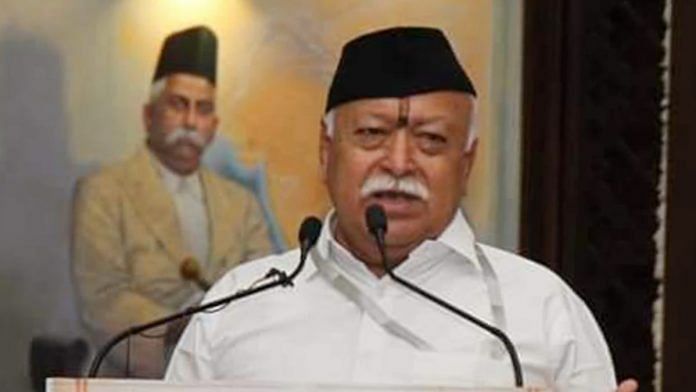New Delhi: Come 19 December, the maiden collection of speeches of Rashtriya Swayamsevak Sangh (RSS)’s chief Dr Mohan Bhagwat is slated to release in New Delhi. The event is significant given that this is only the second collection of speeches of an RSS Sarsanghchalak to be released; the first was of M.S. Golwalkar’s that was released in the 1960s.
Golwalkar, who died in 1973, had taken over the RSS mantle from founder Dr K.B. Hedgewar in 1940 when he died of an illness.
Since then, three more Sarsanghchalaks have been at the helm of affairs — Balasaheb Deoras, Professor Rajendra Singh (who was also known as ‘Rajju Bahiyya’) and K.S. Sudarshan.
In 2009, Bhagwat became the sixth Sarsanghchalak. Aged 59 years, he became one of the Sangh’s youngest Sarsanghchalaks.
Also read: Listen to Mohan Bhagwat’s Dussehra speech. You won’t say RSS lacks intellectual bandwidth
‘Yashaswi Bharat’
Titled ‘Yashaswi Bharat’ (that broadly translates to ‘Glorious Bharat’), the collection is being published in Hindi by Prabhat Prakashan, a publishing house based in Delhi.
This volume has 286 pages and 17 key speeches of the Sarsanghchalak, which shed light on the RSS’ stand and approach to various issues. It covers a spectrum of public discourse and puts forward the RSS’ viewpoint, from women empowerment to the economic model for India. Through his speeches, Bhagwat also talks about ending caste discrimination.
The book also has two very important speeches delivered on 17-18 December 2018 at Vigyan Bhawan in Delhi. These speeches were made in one of the first of its kind outreach programmes by the RSS, in which Bhagwat addressed prominent personalities from all walks of life. He later also answered questions in a Q&A session. These speeches can be called the guiding framework for RSS’ activities. They are being made available to the wider public for the first time through this volume.
M.G. Vaidya, a senior RSS ideologue who is considered to be an intellectual stalwart in the Sangh circle, has penned a detailed introduction to the book. The nonagenarian has the rare distinction of working with all the Sarsanghchalaks closely.
The book will be released by Dr Krishna Gopal, the Sahsarkaryavah (joint general secretary) and Spiritual leader Swami Avdheshananda Giri.
Also read: Hindutva, Swadeshi, family values — RSS’ roadmap for future
Introduction to the book
In Vaidya’s introduction to the book, he writes: “Though it is not easy to understand Sangh but this collection of speeches would be helpful in making those understand it who really want to do it with the right intent.”
Vaidya quoted several excerpts from various speeches, underlining that they explain the essence of all these speeches.
Here are some of the key quotes from Bhagwat’s speeches:
- “The basis of dialogue has to be nationality. We might be having ideological differences but we are all people of one nation and all of us have to work together to make it big. That is why we would continue to have dialogue.” (Page 73)
- “Sangh’s task is to create ideal individuals. These individuals then create an atmosphere in the society; they try to improve the behavior of the society. This is done through collective efforts done on our own…Sangh would do only one thing — creating good individuals, then these Swaymsevaks would go out in the society and do what needs to be done.” (Page 205)
- “We have no enemy — neither in this world nor in this nation. There are people who might be considering us as their enemies. Our job is to not get affected by them and instead take them also along with us. This, in reality, is the ‘Hindutva’.” (Page 221)
- “We are Hindus by tradition, nationality, through our motherland and our forefathers. This is what we say and we would keep on saying this.” (Page 257)
- “We say that we would do whatever we can and whatever you can do , you should do that. But the whole point is that we have to make our nation stand firm because the whole world is looking for the ‘third way’ now. The world knows and we should also know that only Bharat has the capability and inherent strength to provide that ‘third way’.” (Page 276)
- “It is our Hindu identity that teaches us to respect and accept everyone and to do good for everyone. That is why Sangh wants to make Hindu society capable and undefeatable and it will ultimately achieve this objective.” (Page 279)
(The writer is the research director with Delhi-based think-tank Vichar Vinimay Kendra. He has authored two books on the RSS.)
Also read: Hindutva essence of nation’s selfhood, India needs to stay ‘alert’ of China — Mohan Bhagwat




Trite, banal and pathetic